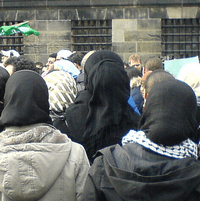A very alarmist mood has lately become the norm among experts of Islam in Europe. Is Europe doomed to become an extension of the Arab West? If you ask the eminent historian Bernard Lewis, the answer is yes. Migration and demography are working toward creating "Eurabia." This allegedly unstoppable march of Islam in Europe is causing unprecedented anxiety for both Europeans and Americans. Emotions run high, and facts are in short supply on both sides of the Atlantic.
Americans are understandably concerned about the "next" Sept. 11. After all, wasn't Mohammed Atta, the ringleader of the hijackers that struck that day, a young Egyptian Muslim radicalized in Europe? For Europeans, the danger is much closer -- in their very own home. Unaccustomed to being a land of immigration, they are increasingly worried about their cultural identity, economic wellbeing and physical security. When emotions run so high, perception defines reality: Futuristic novels titled, "La Mosquée de Notre-Dame," urban legends about Mohammed being the most common name for newborns in Europe, and arguments over which European city will become the capital of Eurabia define what has become a sensationalistic debate.
The sense of despair and panic over the Islamization of Europe comes in different forms. The most classical one involves demographics. According to this thread of Eurabian literature, ever-increasing Muslim birthrates will dwarf Christian populations and radically alter the social fabric of the continent in the next 30 to 40 years. Another variant of Eurabia is ideological, whereby rampant Islamo-fascism is met by typical European appeasement and pacifism. In this version, by the time Europe finally wakes up and tries to put an end to its naïve and helpless attitude toward the militant Islam in its midst, it will be too late. In all the varieties of Eurabian narratives, though, nothing less than Europe's cultural identity and values, based on democracy and enlightenment, are at stake.

